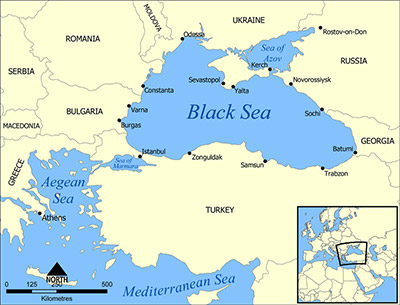 Note: This is an update and addition to two previous posts, “Explainer: What’s Going on in Ukraine?” and “What Just Happened with Russia and Ukraine?.”
Note: This is an update and addition to two previous posts, “Explainer: What’s Going on in Ukraine?” and “What Just Happened with Russia and Ukraine?.”
So what just happened in Crimea?
On Sunday, Crimeans voted overwhelmingly to break with Ukraine and join Russia. Today Russian President Vladimir Putin signed a treaty making Crimea part of Russia (it was a former satellite state of the Soviet Union). Putin says he does not plan to seize any other regions of Ukraine.
Why would Russia want to annex Crimea?
In 1997, Crimea and Russia signed a treaty allowing Russia to maintain their naval base at Sevastopol, on Crimea’s southwestern tip (the lease is good through 2042). The base is Russia’s primary means of extending military force through the Mediterranean. (The Black Sea is connected to the Mediterranean Sea through the Bosphorus Straits.) Without a military base in Crimea, Russia would be weakened as a global military power.
Earlier this month Russia’s parliment authorized a Putin to use the military on Crimea. (Technically, Russia’s parliament authorized Russia’s military forces to enter “Ukraine,” giving themselves a legal cloak to target more than Crimea.)
Where (and what) exactly is Crimea?
 Crimea is a semi-autonomous region located on a peninsula of the Black Sea in southern Ukraine. The Autonomous Republic of Crimea is an autonomous parliamentary republic within Ukraine and is governed by the Constitution of Crimea in accordance with the laws of Ukraine. The region chose to become part of Ukraine after the dissolution of the Soviet Union.
Crimea is a semi-autonomous region located on a peninsula of the Black Sea in southern Ukraine. The Autonomous Republic of Crimea is an autonomous parliamentary republic within Ukraine and is governed by the Constitution of Crimea in accordance with the laws of Ukraine. The region chose to become part of Ukraine after the dissolution of the Soviet Union.
If Crimea is an “Autonomous Republic” then what is wrong with them voting to join Russia?
According to Article 73 of the Ukrainian Constitution, “Alterations to the territory of Ukraine shall be resolved exclusively by the All-Ukrainian referendum.” Crimeans didn’t ask the rest of Ukraine what they thought — they just voted to leave (and the results — 97-percent in favor of seceding — appear to be rigged). International law also does not recognize a right to secede, but it also steers clear of prohibiting unilateral declarations of independence.
Putin claims bringing Crimea back into the Russian fold is “reunification.” He even cheekily said he was sure Germans would understand the Russian people’s quest for reunification, just as Russia had supported German reunification in 1990.
Why does this matter?
The Russian intervention in Crimea could encourage other secession movements and challenge the very principles of a stable world order. Stewart M. Patrick, a Senior Fellow at the Council on Foreign Relations, outlines some of the concerns:
Moscow’s intervention is testing several fundamental norms of world politics: It challenges established principles of sovereignty and nonintervention, it raises the specter of a return to great power spheres of influence, and it elevates the principle of nationality over citizenship. Moreover, it has already exposed, yet again, the weakness of collective security in the face of destabilizing action by a great power.
Other posts in this series:
What Just Happened with Russia and Ukraine?

